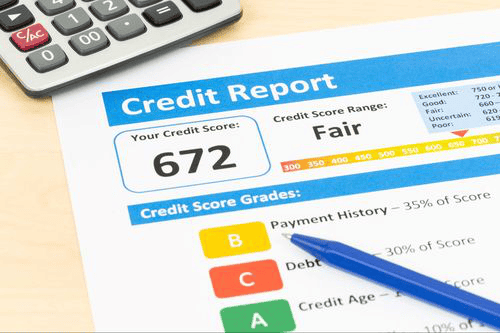Table of Contents
What Are the Origins of Credit Reporting?
As a consumer, you’re likely aware of how your credit score can affect your ability to achieve your financial goals and many aspects of your life. But are you aware of when credit scores were invented and how credit reporting came to be such an integral part of the financial health of consumers?
A credit report comes before a credit score and is a summarization of an individual’s credit history. A credit score is a three-digit number calculated based on information provided in a consumer’s credit report. Before you can understand the background of credit scores, it’s important to learn more about the history of credit reporting.
In its infancy, credit reporting was localized to a specific region and nothing like the nationwide scale that exists today. According to the Federal Reserve Bank of Philadelphia, early credit reporting companies targeted smaller communities and typically reported to a singular creditor. This creditor could be a bank, retailer, or another type of finance company. Cross-industry reporting was not a common practice, meaning that different credit reporting companies did not share information about customers with one another.
During this era, initial credit reports focused on negative payment behaviors and included personal aspects about the consumer, such as recent marriages or arrests. One of the first commercial credit reporting agencies was the Mercantile Agency, commonly known for collecting information about both lenders and consumers in New York City. The agency kept track of a consumer’s age, credit history, moral character, and marital status. While the idea behind collecting consumer and lender information was well-intentioned in some instances during this period, in terms of accurately reporting a consumer’s creditworthiness, it fell short.
The accuracy and fairness of credit reporting began when the U.S. government passed the Fair Credit Reporting Act (FCRA), which established industry-wide standards for reporting accurate financial information about a consumer. The FCRA protects consumers in a multitude of ways, such as restricting access to credit reports and only allowing those with specific permission or purpose to review the report of an individual. Additionally, the FCRA implemented rules for how credit reporting companies can interact with consumers and creditors.
After credit scoring became mainstream in the U.S., credit reporting agencies relied less on reporting moral character evaluations and instead focused on the financial histories and behaviors of consumers. Later in the 19th century, consumer credit reporting was popularized, and there were over 2,000 credit bureaus reported across the nation. Presently, there are three major credit reporting agencies: TransUnion, Equifax, and Experian.
When Did Credit Scores Start?

Before you can learn more about when credit scores were created, understanding who invented the modernized credit score is important. In 1956, Bill Fair and Earl Isaac developed the FICO (Fair Isaac Company) scoring system, which standardized the calculation and categorization of modern credit scores.
Starting in the 1970’s, the FICO score model was commonly used by credit reporting agencies, and by 1989, the first generalizable credit score was finally in existence. Since then, FICO scores are commonly used by financial institutions and lenders in order to determine an applicant’s ability to qualify for a mortgage and other forms of credit.
What Are Credit Scores Like Today?
As previously mentioned, early credit reports were centered around consumers’ payment histories and subjective character assessments from reporters. Comparatively, modern credit reports will include personal information, but they are designed to more effectively and fairly determine an individual’s creditworthiness. Since the personal information in your credit report is used for identification purposes, it does not impact your credit score. Your address, spouse, relevant phone numbers, current or former employers, and the year of your birth are included on your credit report.
Your credit report is a record of your financial behavior as a consumer and includes everything from your name and address to a collection of your accounts and payment history, along with any current credit inquiries. Your credit score is calculated based on the information included in your credit report and determines your overall creditworthiness, which is essentially a measurement of your ability to handle new debt obligations. Whether you are submitting an application for an apartment or applying for a mortgage loan, having a higher credit score generally means you are more likely to receive approval.
Credit scores range from 300-850 and will generally fall into five different categories: Excellent (800-850), Very Good (740-799), Good (670-739), Fair (580-669), and Poor (Below 580). Some of the factors on your credit report that impact your credit score include your payment history, the length of your credit history, your credit age and mix, and your overall credit utilization. Since your payment history makes up around 35% of how your score is calculated, it is important to avoid late or missed payments and loan defaults in order to keep your credit score as high as possible.
What Is the Future of Credit Scores?

Although we have come a long way since early credit reports that promoted unfair and subjective character assessments, there is always room for improvement. The future of credit scores could be adding alternative data sources to credit reports to better assess the creditworthiness of individuals. The proposed alternative data sources that may be added to new credit scoring models include rent payments, digital footprints, educational history, and bank account balances.
While over 200 million consumers have credit reports recorded with one of the major credit bureaus, the Federal Reserve Bank of Kentucky reported that more than 45 million Americans lack sufficient credit history to receive a credit report or score. This may be partially due to the fact that they are considered “credit invisible,” meaning their documented credit history is limited, and the type of payments they routinely make may not be reported to the credit bureaus. Credit-invisible individuals may experience many financial limitations and often rely on high-cost alternative financial products like payday loans when they need to borrow money.
Any rent, utility bill, or Buy Now Pay Later (BNPL) payments that are made on time are generally not reported to Experian, Equifax, or TransUnion. Adding alternative data sources could help credit invisible individuals appear on the bureau’s radar, but there is a risk of class or social biases, as well as obvious privacy concerns since consumers would need to opt-in for data collection.
Making the Most of Your Credit Score
Now that you understand when credit scores were invented and the history of credit reporting, the next step is to know how to make the most of your credit score because it impacts almost every aspect of your financial well-being. Without a strong credit score on your side, it will be challenging to qualify for an unsecured loan or obtain approval for specific types of housing.
Consider the tips listed below to make sure that your score is in the best shape possible to reach your financial goals and put you on the right track financially.
Check Your Credit Report
You should get in the habit of regularly monitoring your credit report. Federal law states that you are entitled to get one free copy of your credit report annually from one of the major credit bureaus. If you want to go the extra mile, you can hire third-party credit monitoring services to alert you if there are any changes or potential issues in your credit report.
That may give you more peace of mind with your finances and distance yourself from the responsibility of managing your credit. Additionally, regularly reviewing your credit report can help you get a better picture of your overall financial health and help you identify areas where you can improve.
Dispute Errors
When regularly reviewing your credit report, make sure to check for errors, fraudulent activity, and inaccuracies so you can be prepared to dispute them. By correcting any errors in your credit report and staying vigilant, you can potentially protect your identity and ensure that your credit score is as accurate as possible.
Some of the most common errors found on credit reports include spelling mistakes for names and addresses or accounts that are incorrectly attributed to your credit report. Other errors that you may find could be accounts with inaccurate balances and mixed credit files.
Borrow Responsibly
On top of paying your bills on time, keep in mind that many financial experts recommend keeping your overall credit utilization ratio under 30%. Don’t borrow up to your available credit limit! Make sure to only rely on credit or borrow money if you are positive that you can afford to pay it back. Since high credit card balances can negatively impact your credit history, your goal should be to keep your utilization low and limit unnecessary spending.
Prioritize Good Financial Decisions
When your credit history is poor, you may have to rely on bad credit loans and other alternative financial products if you need fast cash to handle a tough financial situation. Until you have a sufficient emergency fund, your financial situation could be in jeopardy if unexpected expenses come up.
Make sure to prioritize making informed financial decisions, which includes borrowing more responsibly, creating an emergency fund, and changing your spending habits for the better. Bad financial decisions can hurt your credit score in the long run, but it’s never too late to make progress and choose decisions that better align with your financial goals. Having a better credit score can open more doors for you financially and make it easier for you to reach your goals!





